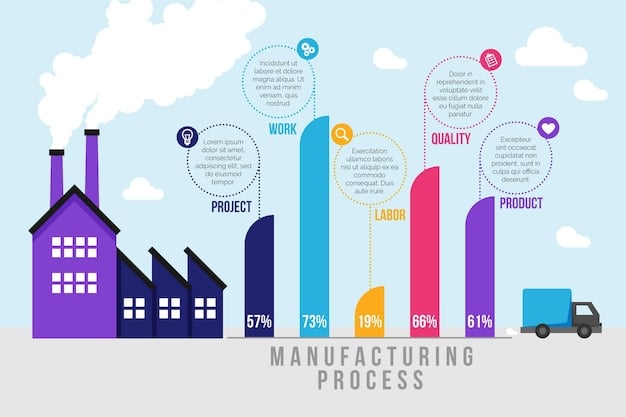REITs and the Economy: Understanding the Correlation for US Investors

REITs (Real Estate Investment Trusts) offer a unique window into the economy, with their performance closely tied to interest rates, economic growth, and real estate market conditions, making them a valuable tool for US investors.
Understanding the relationship between REITs, REITs and the Economy: Understanding the Correlation, and the broader economy is crucial for making informed investment decisions. This article breaks down the key factors linking these entities, providing a clear perspective for US investors.
What are REITs and How Do They Work?
REITs, or Real Estate Investment Trusts, are companies that own or finance income-producing real estate across a range of property sectors. Understanding their basic structure is the first step in grasping their economic impact.
These entities allow individual investors to buy shares in real estate portfolios, similar to how they invest in stocks or mutual funds. This diversification can be particularly attractive.
Types of REITs
REITs are broadly classified into several types, each with its own investment focus. These include equity REITs, mortgage REITs (mREITs), and hybrid REITs.
- Equity REITs: Own and operate income-producing real estate properties.
- Mortgage REITs (mREITs): Invest in mortgages or mortgage-backed securities.
- Hybrid REITs: Combine both equity and mortgage investments.
Each type responds differently to economic conditions, so knowing the distinctions is essential for strategic investment.
In summary, REITs offer a way for investors to participate in the real estate market without directly owning properties. The different types provide varied exposure to the real estate sector, influencing their performance in different economic climates.
REITs as Economic Indicators
Because REITs are tied to real estate and financing, they can serve as indicators of economic health. Changes in REIT performance often reflect broader shifts in the economy.
For example, strong REIT performance might signal robust commercial activity and consumer spending, while declines could indicate economic slowdowns.
Factors Influencing REIT Performance
Several economic factors influence the performance of REITs. These include interest rates, inflation, and overall economic growth.
Interest rates play a significant role. When rates are low, REITs can borrow money more cheaply, increasing profitability. Conversely, higher rates can reduce profitability and investor demand. Inflation can also impact REITs, as rising costs can affect property values and rental income.
In conclusion, monitoring REIT performance can provide insights into the broader economic landscape. Key factors like interest rates and inflation significantly impact REIT profitability and investor behavior.

Correlation Between REITs and Interest Rates
The relationship between REITs and interest rates is crucial. Understanding this correlation can help investors predict how REITs might perform in different rate environments.
Generally, REITs and interest rates have an inverse relationship. When interest rates rise, REIT prices often fall, and vice versa.
Why the Inverse Relationship?
Several reasons explain this inverse relationship. Higher interest rates increase borrowing costs for REITs, reducing their profitability. Additionally, rising rates make fixed-income investments more attractive compared to REITs.
- Increased borrowing costs: Higher rates can make it more expensive for REITs to finance property acquisitions and improvements.
- Alternative investments: Rising rates can draw investors to bonds and other fixed-income options.
- Impact on property values: Higher rates can depress property values, affecting REIT asset values.
Understanding these dynamics is key for investors as they navigate changing interest rate environments. By considering these factors, investors can better anticipate how REITs might respond.
In summary, the inverse relationship between REITs and interest rates is driven by borrowing costs and competing investment options. Investors should closely monitor interest rate trends to make informed decisions about REIT investments.
REITs and Inflation: A Complex Relationship
Inflation can have varying effects on REITs. While some REITs might benefit from rising prices, others could face challenges.
The impact of inflation on REITs depends on their ability to pass increased costs on to tenants through higher rents.
REITs That Benefit from Inflation
Certain types of REITs are better positioned to benefit from inflation. These include REITs with short-term leases and those owning properties in high-demand areas.
REITs with short-term leases can quickly adjust rents to match rising prices. Properties in high-demand areas may also see increased rental rates, offsetting inflationary pressures.

Conversely, REITs with long-term leases may struggle to increase rents fast enough to keep pace with inflation. Additionally, rising operating costs can erode profitability.
In short, the impact of inflation on REITs is nuanced and depends on factors like lease terms and property locations. Investors should consider these variables when assessing the risk and potential returns of REIT investments during inflationary periods.
REITs and Economic Growth
The overall health of the economy significantly influences REIT performance. During periods of economic expansion, REITs often thrive.
Economic growth typically leads to increased demand for commercial and residential properties, boosting rental income and property values.
Sector-Specific Impacts
Different sectors within the REIT market respond differently to economic growth. For example, retail REITs often benefit from increased consumer spending, while industrial REITs thrive with rising manufacturing and trade activity.
- Retail REITs: Increased consumer spending drives demand for retail spaces.
- Industrial REITs: Growing manufacturing and trade sectors boost demand for warehouse and logistics facilities.
- Residential REITs: Economic growth often leads to higher occupancy rates and rental income.
A strong economy can also lead to job creation, increased income, and higher consumer confidence. These factors can further support demand for real estate and drive REIT performance.
In brief, economic growth generally supports REIT performance by increasing demand for properties and boosting rental income. The specific impact, however, can vary across different REIT sectors based on their exposure to various economic activities.
Making Informed Investment Decisions
To make informed investment decisions about REITs, consider several key factors. These include understanding your risk tolerance, diversifying your portfolio, and staying informed about economic trends.
Diversification is crucial to mitigate risk. By spreading your investments across different types of REITs and other asset classes, you can reduce the impact of any single investment’s underperformance.
Tips for US Investors
Here are some practical tips for US investors looking to incorporate REITs into their portfolios.
First, research different REIT sectors to find those that align with your investment goals. Second, monitor economic indicators and industry news to stay ahead of market trends. Finally, consult with a financial advisor to ensure your REIT investments fit within your overall financial plan.
Remember to consider the tax implications of REIT investments. REITs often distribute a significant portion of their income to shareholders, which can result in higher tax liabilities compared to other investments.
In conclusion, investing in REITs requires a strategic approach that considers both economic conditions and individual investment goals. By diversifying, staying informed, and understanding the tax implications, US investors can make well-informed decisions about REITs.
| Key Aspect | Brief Description |
|---|---|
| 🏢 REIT Definition | Companies that own or finance income-producing real estate. |
| 📈 Interest Rates | Inverse relationship: rising rates can decrease REIT profitability. |
| 🔥 Inflation Impact | Mixed impact, depends on lease terms; short-term leases benefit more. |
| 🌱 Economic Growth | Generally boosts REIT performance by increasing demand for properties. |
FAQ Section
▼
A REIT is a company that owns, operates, or finances income-producing real estate. REITs allow investors to buy shares in real estate portfolios, offering diversification and potential income.
▼
Generally, rising interest rates can negatively impact REITs. Higher rates increase borrowing costs for REITs and make fixed-income investments more attractive relative to REITs.
▼
Some REITs, particularly those with short-term leases, can benefit from inflation. They can adjust rents more quickly to keep pace with rising prices, potentially offsetting inflationary pressures.
▼
REITs can enhance diversification by offering exposure to the real estate market. They provide a different return profile compared to stocks and bonds, reducing overall portfolio volatility.
▼
Understanding this correlation allows investors to make informed decisions. By knowing how economic factors influence REIT performance, investors can better manage their risk and returns.
Conclusion
Understanding the intricate relationship between REITs, REITs and the economy: Understanding the Correlation, and broader economic factors is essential for US investors aiming to navigate the real estate market successfully. By considering interest rates, inflation, and economic growth, investors can make informed decisions and strategically incorporate REITs into their portfolios, enhancing diversification and potential returns.





